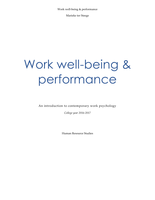Work well-being & performance
Marieke ter Steege
Work well-being &
performance
An introduction to contemporary work psychology
College year 2016-2017
Human Resource Studies
, Work well-being and performance • • • Marieke ter Steege
H1. Introduction
1.1 What we talk about when we talk about work psychology
Work can be defined as a set of coordinated and goal-directed activities that are conducted in exchange
for something else (mostly monetary rewards). Three key elements:
1. Work consists of a set of goal-directed activities: actions at work are intended to bring about a
particular previously specified result. The goal is to produce a good or to deliver a particular
service.
2. Work consists of a set of coordinated activities: to achieve the intended goal, workers do not act
randomly. This means following work routines, procedures and guidelines and using tools and
machinery especially devised to bring about the intended goal.
3. The activities involved in working require some degree of physical, emotional and/or mental
effort, and this effort is usually compensated in some way. That is, work is conducted in
exchange for something else.
Work psychologists are not only interested in pushing worker’s performance to their upper limit. At
present many work psychologists are primarily interested in maximizing worker health and well-being
(this used to be different in the early days of work psychology).
Contemporary work psychology aims to promote what might be called sustainable performance,
maximizing work performance as well as worker health and well-being.
- Organizational psychology is about the context in which the activities that are conducted by
workers are conducted (organization, work team, leadership).
- Personnel psychology is about the characteristics of the person conducting a particular work task
or selecting or hiring new staff (gender, age, ethnicity, education, experience, personality).
- Work psychology is about the tasks that are carried out at work, that is, the specific activities that
are conducted to achieve a particular goal. We focus on work psychology.
1.2 Who do we mean when we talk about workers?
The world labour force comprises people aged 15 and older who meet the International Labour
Organization (ILO) definition of the economically active population: all people who supply labour for
the production of goods and services during a specified period. It includes both the employed and the
unemployed. Homemakers and other unpaid caregivers and workers in the informal sector are excluded.
Out of a world population of 7 billion people, 3 billion are employed and 205 million are unemployed.
When considering international labour statistics a distinction is generally made between three different
work sectors:
1. Agriculture: forestry, hunting and fishing.
2. Industry: manufacturing, mining and construction.
1
, Work well-being and performance • • • Marieke ter Steege
3. Services: transportation, communication, public utilities, trade, finance, public administration,
and private household services.
One of the major drawbacks of contemporary work psychology is its narrow scope. Work psychological
research is predominantly conducted in Western-oriented economies. Even within the countries where
work psychology is flourishing, there is an inclination to focus on white-collar, professional and middle
to highly educated employees working in large organizations. There is comparatively little research on
the lower segment of the labour market and on ethnic/racial minorities.
1.3 The meaning of working
Research comparing the quality of life of unemployed and employed people shows that the latter are
usually considerably happier than the former.
The relation between unemployment and health runs both ways: whereas lack of health increases the
chances of becoming unemployed, unemployment also contributes to the emergence of health problems.
Why being unemployed yields negative consequences is explained by Marie Jahoda’s (1982) Relative
Deprivation Model. She concluded that part from providing an income, having employment also
provides five classes of social benefits: time structure, opportunities for social contact, sharing of a
common purpose, social identity or status, and regular activity.
Matt Groening’s (1987) famous dictum: ‘work is hell – but it beats unemployment’.
1.4 The roots of work psychology
Contemporary work psychology is concerned with promoting sustainable performance, that is,
stimulating high work performance as well as maintaining (and even enhancing) worker health and well-
being.
When researchers started to study work and organizations systematically in the middle of the 19th the
emphasis was on the best way of organizing work and the work organization, and on the socio-political
implications of this.
A long time ago, scholars had already considered how particular tasks should be conducted. For
example, the Hippocratic collection (ancient Greek medical knowledge) provided Greek doctors with
detailed guidelines on how types of complaints were to be treated, and is basically a collection of
routines and guidelines.
Another early example of systematic thinking is seen in the Roman army, which was organized
according to simple and clear rules.
A more scientific (systematic, evidence-based) approach to examining work and its effects and
antecedents only emerged much later, after the middle ages has ended.
The birth of occupational health psychology
The scientific study of work, worker health and well-being, and work performance can be traced back to
the 1500s, when Georg Bauer (Agricola) published De Re Metallica (On metal matters), an influential
2







